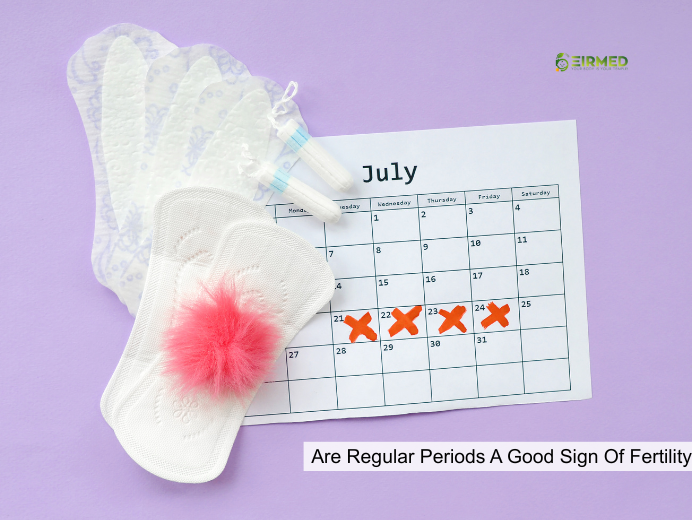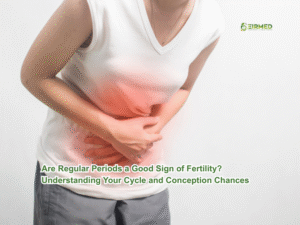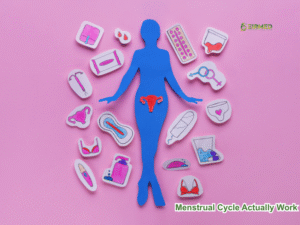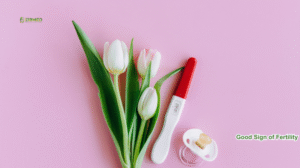Are Regular Periods A Good Sign Of Fertility 2025 | Proven Insights for Women

Are Regular Periods a Good Sign of Fertility? Understanding Your Cycle and Conception Chances
 Have you ever looked at your calendar and thought, “My periods come right on time every month, does that mean I’m ready to have a baby?” Lots of people wonder about this. Are regular periods a good sign of fertility? Well, it’s a common question, and the answer isn’t always straightforward. At EIRMED, we help folks with all kinds of fertility needs, offering supplements and treatments for both guys and gals. In this piece, we’ll chat about what your menstrual cycle really tells you about getting pregnant, how it all works, and some tips to boost your chances. We’ll keep it simple so anyone can follow along.
Have you ever looked at your calendar and thought, “My periods come right on time every month, does that mean I’m ready to have a baby?” Lots of people wonder about this. Are regular periods a good sign of fertility? Well, it’s a common question, and the answer isn’t always straightforward. At EIRMED, we help folks with all kinds of fertility needs, offering supplements and treatments for both guys and gals. In this piece, we’ll chat about what your menstrual cycle really tells you about getting pregnant, how it all works, and some tips to boost your chances. We’ll keep it simple so anyone can follow along.
Regular periods can point to your body working in a steady way, which is great for ovulation that’s when an egg is ready for sperm. But fertility involves more stuff, like how old you are, your health, and daily habits. If you’re hoping to start a family, getting to know your cycle can really help. Let’s break it down nice and easy.
How Does Your Menstrual Cycle Actually Work?

Think of your menstrual cycle like a monthly routine your body follows to get set for a possible pregnancy. It kicks off on the first day you start bleeding and wraps up just before the next period hits. Most cycles last between 21 and 35 days, with the bleeding part going on for 2 to 7 days. It’s all driven by hormones that rise and fall like waves.
Here’s a quick look at the main parts:
- The Bleeding Phase (Menstruation): This is your period. If no baby is on the way, your body lets go of the uterus lining it built up.
- The Egg-Growing Phase (Follicular Phase): Starts with your period and goes until ovulation. Your brain sends signals to grow eggs in the ovaries. One usually wins out and gets ready.
- Ovulation Time: Happens around the middle say day 14 in a 28-day cycle. The egg pops out of the ovary, ready to meet sperm. This is your prime time for conceiving.
- The Waiting Phase (Luteal Phase): After the egg’s out, your body preps the uterus for a fertilized egg to stick. If nothing happens, hormones drop, and your period starts again.
Getting this? A smooth cycle often means things are balanced. But if you’re asking, “Are regular periods a good sign of fertility?” it helps to know ovulation is key. Without it, no egg means no pregnancy.
What Counts as Regular Periods?
 Regular periods show up every 21 to 35 days, last about the same each time, and have a flow that’s not too much or too little. Mild cramps are normal, but nothing that knocks you out. This steady pattern suggests your hormones, like estrogen and progesterone, are doing their job right.
Regular periods show up every 21 to 35 days, last about the same each time, and have a flow that’s not too much or too little. Mild cramps are normal, but nothing that knocks you out. This steady pattern suggests your hormones, like estrogen and progesterone, are doing their job right.
But hey, even if your periods are like clockwork, it doesn’t mean everything’s perfect for fertility. Sometimes, other things get in the way, like egg quality or tube issues. Signs of fertility in a woman go beyond just the calendar they include stuff like fertile mucus or a temp spike during ovulation.
At EIRMED, we’ve got supplements for women to help keep those hormones in check and support regular cycles. If your periods are spot on but pregnancy isn’t happening, it might be worth a deeper look.
Are Regular Periods a Good Sign of Fertility?
 Are regular periods a good sign of fertility? If you’re thinking about starting a family or just curious about your body’s signals, this question might have crossed your mind. Regular periods often suggest that your hormones are in balance and your body is preparing for a possible pregnancy each month. But let’s take it step by step. At EIRMED, we focus on helping people like you with fertility products and treatments for both men and women. We’ll explore what regular periods mean, how they link to fertility, and what other factors play a role.
Are regular periods a good sign of fertility? If you’re thinking about starting a family or just curious about your body’s signals, this question might have crossed your mind. Regular periods often suggest that your hormones are in balance and your body is preparing for a possible pregnancy each month. But let’s take it step by step. At EIRMED, we focus on helping people like you with fertility products and treatments for both men and women. We’ll explore what regular periods mean, how they link to fertility, and what other factors play a role.
Imagine your menstrual cycle as a monthly rhythm that your body follows. When it runs smoothly, it can feel reassuring. But does that always mean everything is set for conception? Not necessarily. Some people have clockwork cycles yet face challenges getting pregnant. Others might have irregular ones but still conceive easily. What makes the difference? Let’s look closer to help you understand your own situation better.
Does a Regular Period Mean You’re Ovulating?
Most of the time, yeah. If your cycles are consistent, you’re probably ovulating each month. Ovulation is that moment when the egg leaves the ovary, giving sperm a shot at it. Does regular period mean ovulation? It’s a strong hint, but not a sure thing.
Some folks have periods without ovulating called anovulation. Stress, weight changes, or health stuff can cause it. To check, watch for signs: Your cervical mucus gets clear and slippery like egg whites around ovulation. Or use kits that spot the hormone surge before the egg drops.
If you’re tracking and see these signs with regular periods, that’s good news for fertility. But if not, talk to a doc. Are regular periods a good sign of fertility? They can be, especially with ovulation in the mix.
How Cycle Length Ties into Fertility
The length of your cycle matters a bunch for getting pregnant. Cycles around 26 to 32 days often mean better odds because ovulation is predictable. Shorter or longer ones might mess with timing.
If your cycles jump around, it’s harder to pinpoint fertile days. Menstrual cycle length and fertility are linked steady lengths usually mean steady egg releases.
Long cycles? Could be something like PCOS, where hormones are off. Short ones might mean low progesterone, making it tough for a pregnancy to stick. If this sounds like you, checking with a specialist can help sort it out.
Why You Might Have Fertility Troubles Even with Regular Periods
It’s frustrating, right? Periods on time, but no baby. Here are some common reasons:
- Getting Older: After 35, eggs decrease in number and quality, even if periods are regular.
- Endometriosis Issues: Tissue growing where it shouldn’t can block things, causing pain but not always messing with cycle timing.
- Thyroid Glitches: Too much or too little thyroid hormone affects fertility without changing your periods much.
- Guy Stuff: Sperm count, shape, or movement problems are half the battle. Doesn’t show in your cycle.
- No Clear Reason: Sometimes tests come back normal, but it just doesn’t happen. Called unexplained infertility.
These show that while are regular periods a good sign of fertility, they’re not the whole story. Other factors sneak in.
Other Signs You’re Fertile Besides Periods
Don’t just rely on your period. Look for these too:
- A little pain on one side during ovulation called mittelschmerz.
- Sore breasts mid-cycle from hormone shifts.
- Feeling more energetic or in the mood around ovulation time.
- That slippery, clear mucus signaling fertile days.
Pair these with regular periods, and you’ve got solid signs of fertility in a woman. It’s your body’s way of saying, “Hey, now’s a good time!”
Ways to Track Ovulation When Periods Are Regular
Tracking makes it easier to hit those fertile days. Try these:
- Mark your period starts on a calendar or app to guess ovulation.
- Take your temperature first thing each morning it jumps a bit after ovulation.
- Use pee sticks for ovulation kits to catch the hormone peak.
- Apps can log all your symptoms and predict windows.
Fertility tracking methods turn guessing into knowing. With regular periods, it’s even simpler to spot patterns.
The Role of Hormones in Periods and Fertility
 Hormones are the conductors of your cycle. Follicle-stimulating hormone (FSH) kickstarts egg growth, while luteinizing hormone (LH) triggers release. Estrogen builds the uterine lining, and progesterone maintains it for implantation. Imbalances can cause issues even with regular periods.
Hormones are the conductors of your cycle. Follicle-stimulating hormone (FSH) kickstarts egg growth, while luteinizing hormone (LH) triggers release. Estrogen builds the uterine lining, and progesterone maintains it for implantation. Imbalances can cause issues even with regular periods.
For men, testosterone supports sperm production. Thyroid hormones influence both genders’ fertility. If levels are off, symptoms like fatigue or weight changes appear. Blood tests check this. EIRMED provides hormone-supporting treatments to restore balance gently.
Emotional Aspects of Fertility Journeys
Fertility isn’t just physical it’s emotional too. Waiting for a positive test can bring anxiety, especially if periods come regularly yet pregnancy doesn’t. Talk to loved ones or join support groups. Mindfulness or counseling helps cope.
Celebrate small wins, like understanding your body better. At EIRMED, we care about your whole well-being, offering resources beyond products. You’re not alone in this.
When to Worry About Fertility
If you’ve been trying without luck for a year (or half that if over 35), it’s time to chat with a pro. Watch for:
- Super painful periods that mess with your day.
- Really heavy flow or spotting out of nowhere.
- No pregnancy after regular tries.
Catching issues early helps. At EIRMED, our products for men and women can support while you figure things out. Are regular periods a good sign of fertility? Sure, but if pregnancy’s not happening, dig deeper.
Natural Ways to Up Your Fertility
Want to give nature a hand? Here’s how:
- Eat balanced: Load up on veggies, fruits, nuts, and proteins. Stuff like folate and zinc helps.
- Move your body: 30 minutes of walking or yoga a day keeps things flowing without overdoing it.
- Chill out: Stress busts hormones try breathing exercises or walks.
- Skip smokes and cut booze: They hurt eggs and sperm.
- Grab supplements: EIRMED has vitamins like CoQ10 for better egg health.
Little changes can make a big difference, even with regular periods.
If You Need Extra Help: Fertility Treatments
Sometimes nature needs a boost. Options include:
- Pills to kickstart ovulation.
- IUI, where sperm goes straight into the uterus.
- IVF, fertilizing eggs in a lab then placing them back.
EIRMED supplies meds for these at good prices. Talk to your doc about what’s right.
Wrapping It Up: Periods and Your Fertility Path
So, are regular periods a good sign of fertility? Often yes, they hint at regular ovulation and balanced hormones. But remember, age, health, and more play roles. By tuning into your cycle and living healthy, you boost your shot at conceiving. If bumps come up, pros and treatments are there.
Struggling with fertility? EIRMED’s got your back with products for guys and gals. Drop us a line or check our site for more.
What are regular periods
Regular periods are a key indicator of menstrual health, typically occurring every 21 to 35 days with consistent duration and flow. Understanding what makes a period “regular” can help individuals monitor their reproductive health and identify potential concerns early. Below is a concise overview optimized for clarity and search engine visibility.
- Cycle Consistency: Regular periods occur at predictable intervals, usually every 21-35 days, with minimal variation.
- Duration and Flow: Bleeding lasts 3-7 days with a steady flow, varying minimally month to month.
- Symptom Patterns: Minimal or predictable symptoms like mild cramps or bloating, without severe disruptions.
- Health Indicator: Regularity often reflects balanced hormones, but irregularities may warrant medical advice.
Does regular period mean ovulation? A Clear Guide
Regular periods, occurring every 21-35 days with consistent flow, often suggest ovulation but don’t always guarantee it. Ovulation typically triggers the hormonal changes leading to menstruation, but factors like stress or hormonal imbalances can disrupt this process. This concise guide explores their connection for better menstrual health awareness, optimized for search visibility.
- Cycle Regularity: Regular periods usually follow a 21-35 day cycle, often indicating ovulation occurs around day 14.
- Ovulation Link: Ovulation is the release of an egg, typically preceding a period, but anovulatory cycles (no ovulation) can still produce bleeding.
- Health Factors: Stress, PCOS, or thyroid issues may cause regular-looking periods without ovulation, requiring medical evaluation.
- Tracking Insights: Monitoring symptoms like cervical mucus or using ovulation tests can confirm ovulation for better health understanding.
Are Periods Related to Fertility? A Clear Guide
Periods are closely tied to fertility, as they reflect the hormonal and reproductive processes, particularly ovulation, that enable conception. Regular menstrual cycles (21-35 days) often indicate consistent ovulation, a key factor in fertility, while irregular or absent periods may signal challenges. This guide explores how periods relate to fertility, optimized for clarity and search visibility.
- Ovulation and Fertility: Regular periods typically suggest ovulation occurs, releasing an egg essential for conception.
- Cycle Regularity: Consistent cycles (21-35 days) often correlate with balanced hormones, supporting fertility.
- Irregularities and Concerns: Irregular or absent periods, possibly due to PCOS or stress, may indicate ovulation issues, impacting fertility.
- Health Monitoring: Tracking cycle patterns and symptoms like cervical mucus can provide insights into fertility health.
Integrating Lifestyle for Long-Term Fertility Health
Long-term, build habits that sustain fertility. Quit smoking it damages eggs and sperm. Limit alcohol to moderate levels. Manage chronic conditions like diabetes.
Environmental factors: Use natural cleaning products to avoid endocrine disruptors. Regular check-ups catch issues early. EIRMED’s ongoing support with products keeps you on track.
FAQ ( Frequently Ask Questions )
Are regular periods a good sign of fertility?
Often yes, as they suggest consistent ovulation. However, other factors like egg quality can still affect conception.
What if I have regular periods but can’t get pregnant?
It could be due to issues like blocked tubes or male factors. Consult a doctor for tests.
How can I tell if I’m ovulating with regular periods?
Track basal temperature, use OPKs, or note cervical mucus changes for clues.
Do irregular periods mean infertility?
Not always. Many with irregular cycles conceive, but it might take longer or need treatment.
Can lifestyle changes improve fertility?
Yes, healthy eating, exercise, and stress reduction can balance hormones and boost chances.
When should I worry about my periods and fertility?
If trying unsuccessfully for a year (or six months over 35), or if periods change suddenly, seek advice.
Overall Purpose
This article helps you understand if regular periods signal good fertility. It explains cycle basics, links to conception, myths, and tips to improve your chances. At EIRMED, we provide info and products for male and female fertility needs. Stay informed to make smart choices and feel hopeful about building your family. (78 words)
Disclaimer
This content is for general information only and not medical advice. Consult a healthcare professional for personalized fertility guidance. EIRMED products support health but don’t guarantee results. Always follow directions and seek expert opinion before use.
Thank You
Thank you for exploring this topic with us at EIRMED. We hope this information empowers you on your fertility journey. Whether you’re seeking male or female fertility solutions, our products and treatments are here to help. Reach out if you need more guidance, we’re committed to your success.
By EIRMED Fertility Team | 12 min read

Eirmed is an informational platform dedicated to providing reliable, science-based insights on male and female fertility, reproductive health, and natural conception.

helloI like your writing very so much proportion we keep up a correspondence extra approximately your post on AOL I need an expert in this space to unravel my problem May be that is you Taking a look forward to see you